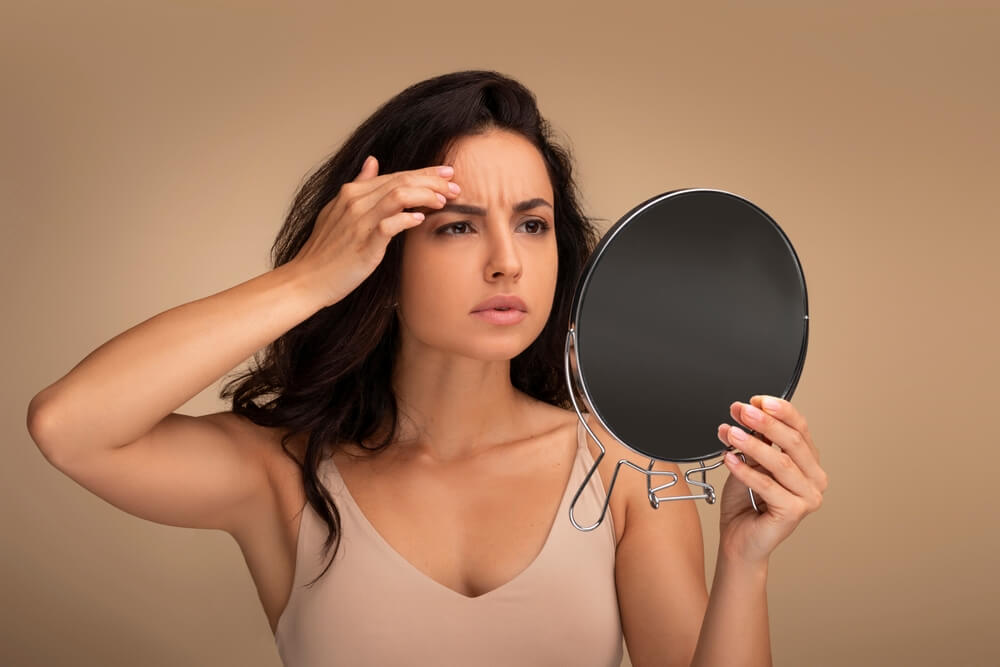We all know beauty trends come and go. The padded shoulders of the 80s, the thick Brooke Shields eyebrows, the extreme slenderness of Twiggy – we cycle in and out of looks, updating (or not!) as we go.
But when it comes to skincare, fortunately, we can rely on science versus fads. One skincare ingredient that’s trendy is also backed by science to pack a powerhouse of benefits — Vitamin C.
We Can’t Live Without Vitamin C
Vitamin C, or ascorbic acid, is a nutrient your body can’t live without. It plays a role in the formation of blood vessels, cartilage, muscle, and collagen. It also helps us heal.
Unfortunately, humans can’t produce it on their own. We have to absorb it from the food we eat, like citrus, and certain vegetables including red peppers, broccoli, and tomatoes. If people don’t get enough of it, they can start to develop a disease called scurvy within a month. This is a horrible condition, first documented in about 1550 BC, which starts with soreness and weakness, progressing to bleeding gums, hair loss, and even death. Unfortunately, it’s not a disease of the past: it can show up anywhere malnutrition is present.
As crucial as it is to daily living, the benefits of Vitamin C go beyond that vital baseline. From brightening to protecting, Vitamin C is also a “must have” skincare ingredient.
The Many Skin Benefits of Topical Vitamin C
Get ready for a long list of benefits! But keep reading, because we also share some key information for what to look for in Vitamin C products to make sure you can reap all the benefits.
Boosts collagen
Collagen is a naturally occurring protein in your body. It plays many roles, one of which is to give skin its firm, elastic structure. Unfortunately, it lessens over time, which is why skin on a 40-year-old person looks different than skin on a 20-year-old.
Two enzymes in your body work together to produce collagen and they need Vitamin C to act as a synthesizer. More than a boost, it’s a necessary ingredient.
Protects
Somehow, we all accept that we need to neutralize free radicals…without necessarily understanding what they are. Essentially, they’re atoms missing an electron. Like a contestant in musical chairs, they race around looking for an electron – even if it’s already taken. It would be like pulling a chair out from underneath someone who’s already sitting there. When it comes to your skin, “stealing” electrons damages its structure.
That’s where Vitamin C comes in. Rich in antioxidants, it can give electrons to the free radicals, which neutralizes them.
Brightens
Studies have shown that Vitamin C can block or reduce the production of melanin. We all need melanin – it provides color (pigmentation) to your skin, eyes, and hair – and it’s found everywhere in your body, even in your brain. It also absorbs harmful rays, including blue light.
However, sometimes you can produce too much melanin, resulting in dark spots (sometimes called “age spots” or “sunspots”). By blocking some of that production, Vitamin C can help fade dark spots, which in turn can help your skin look brighter and have a more even tone.
(And because it reduces inflammation – as part of its anti-oxidant role – it can also reduce redness or puffiness.)
Hydrates
Vitamin C also helps your skin retain more of its own moisture. According to a 2022 review of several studies, magnesium ascorbyl phosphate, another vitamin C derivative found in skincare, decreases transepidermal water loss. That’s a technical term that simply means it helps you keep the natural moisture your skin already has.
How to use it
While you can find hundreds of products that claim to contain Vitamin C, they’re not equally effective.
“You want to check the type of Vitamin C,” says Ashley Clark, MD of Golden State Dermatology in Los Gatos and Mountain View. “The most effective form is a serum containing L-ascorbic acid. If you’re new to using this type of product, or you know you have sensitive skin, look for a less irritating form of Vitamin C: THD Ascorbate. Apply it in the morning, before moisturizer and sunscreen, so you can benefit from its antioxidant protection throughout the day.”
What to avoid
Another thing to look for when shopping for Vitamin C skincare products is the packaging. Vitamin C can degrade over time. Choose opaque packaging to protect the contents from light and air exposure.
“You can always talk to a dermatologist,” said Dr. Clark of Golden State Dermatology. “It’s confusing to navigate through the choices on all the websites and at all the stores out there. We can help patients find the best product for their specific needs and concerns, and also help them learn what to look for.”
Sources:
https://www.ncbi.nlm.nih.gov/pmc/articles/PMC5579659/
https://www.healthline.com/health/beauty-skin-care/vitamin-c-serum-benefits#benefits







